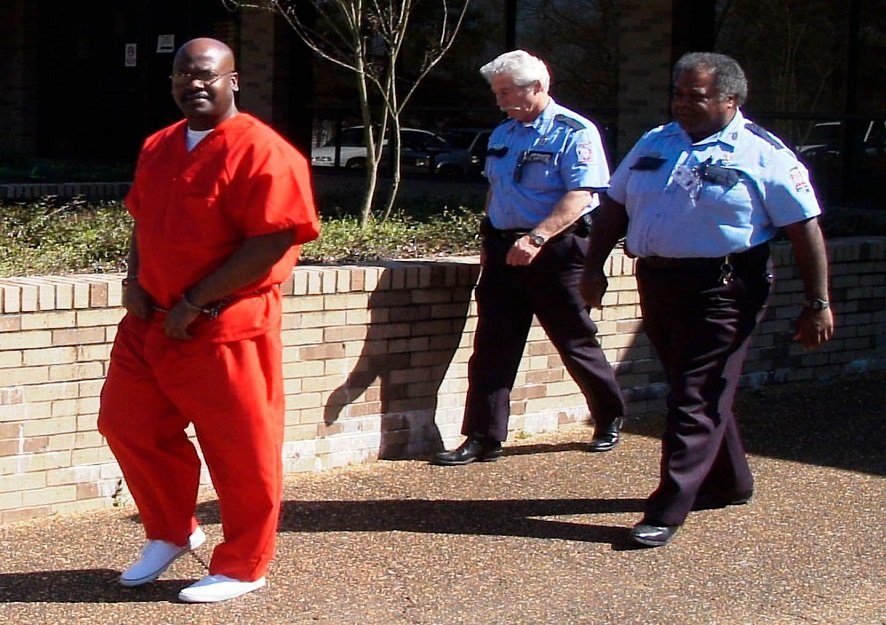For African-Americans, a normal day in the U.S. could quickly deteriorate, with chances of landing in an American jail for lengthy periods.
Such is the ordeal of Curtis Flowers, a 49-year-old male who has been sentenced for quadruple murders despite maintaining his innocence.
Flowers has been in jail for more than 20 years. He was arrested in 1996 after four people were found shot to death in a furniture store in Winona, Mississippi.
On July 16, 1996, store owner Bertha Tardy, 59, deliveryman Robert Golden, 42, part-time employee Derrick Stewart, 16, and bookkeeper Carmen Rigby, 45, were shot and killed at the Tardy Furniture Store. Of the dead, it was only Golden who was black; the others being white.

Flowers was a worker at the store the murders took place and had been fired weeks prior to the murders by the owner. His pay was withheld to cover the cost of merchandise he supposedly damaged, an employee told prosecutors. Curiously, nearly $300 was detected missing after the killings.
Despite Flowers having no prior criminal record and evidence being circumstantial that he was indeed the killer of the fallen, the prosecutor pushed for his imprisonment.
It didn’t matter that the gun used in the incident could not be independently ascertained; it didn’t matter that the star witness account the lead police officer relied on as having been confessions Flowers gave him in jail has been countered. Flowers had maintained that he never killed and never confessed to the killing.
Flowers was found guilty in his first three trials – the first one with an all-white jury and the next two with just one black juror. The fourth and fifth trials ended in mistrials.
And recently, Mississippi’s Supreme Court overturned the first three convictions due to “numerous instances of prosecutorial misconduct”, including discriminating against black jurors.
Defence lawyers argued that witness statements and physical evidence against Flowers are too weak to convict him, especially when eyewitness accounts and evidence at the scene have been contested.
Flowers would have been left to rot in prison or executed had the ‘In the Dark’ podcast not featured his extraordinary case in its investigative journalism report. The podcast was produced by American Public Media and was hosted and narrated by Madeleine Baran, with help from Samara Freemark.
The podcast enabled Flowers’ case to be keenly followed by citizens, especially folks from the black community. It also showed how district attorney Doug Evans had gone to great lengths to put Flowers behind bars despite glaring breaches.
Despite Flowers being tried six times for the same crime and maintaining his innocence all along and winning appeals, the prosecutor would not relent but just try the case all over again, keeping Flowers on death row.
The U.S. Supreme Court justices ruled 7-2 that Flowers’ right to a fair trial had been violated because the prosecution excluded black jurors.

District attorney Doug Evans ensured with his sixth trial that the jury was made up of 11 white people and one African American, striking off five black prospective jurors.
Justice Brett Kavanaugh held in the courtroom that Evans, serving as the prosecutor, had removed 41 of the 42 prospective black jurors over the six trials, noting that “the numbers speak loudly,” while adding “we cannot ignore that history.”
In dissent, the only African American Supreme Court justice, Justice Clarence Thomas, who ought to know better, called Kavanaugh’s opinion “manifestly incorrect” and wrote that Flowers “presented no evidence whatsoever of purposeful race discrimination.”
He added that the Supreme Court, throwing out the murder conviction and death sentence of Flowers because of a prosecutor’s efforts to keep African Americans off the jury had one redeeming quality: “The state is perfectly free to convict Curtis Flowers again.” This shows that Flowers could be put on trial a seventh time.
In the course of selecting a jury, lawyers can excuse a juror merely because of a suspicion that a particular person would vote against their client in a move called peremptory strikes.

The Supreme Court sought to stamp out discrimination in the composition of juries in Batson v Kentucky in 1986. The court ruled then that jurors could not be excused from service because of their race and set up a system by which trial judges could evaluate claims of discrimination and the race-neutral explanations by prosecutors.
For Flowers’ family, they believe in his innocence. However, Benny Rigby, whose wife was killed in the shooting, seeks Flowers’ death, saying: “There is no justice. If he was white, he would have been executed by now.”
Flowers is still being held because he is still under indictment for the murders. Once the local Mississippi court vacates Flowers’ conviction as directed by the Supreme Court, the 49-year-old will be released from death row at the Mississippi State Penitentiary, also known as Parchman Farm.
What then becomes of the wasted years even if Flowers regains freedom? Two decades lost because a public officer allowed his prejudice to prevail to the detriment of another African-American male.










